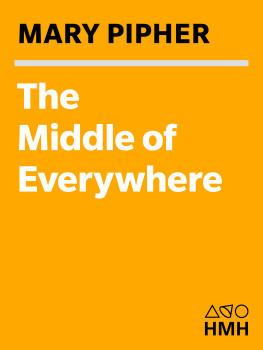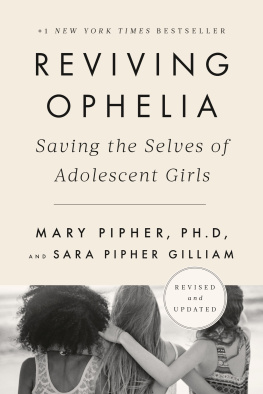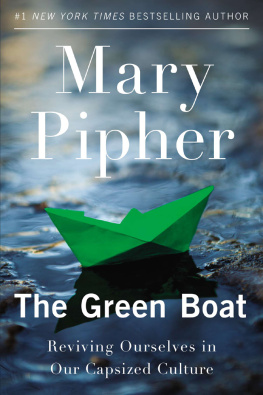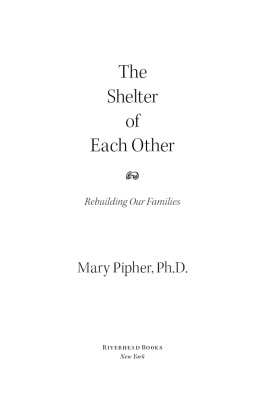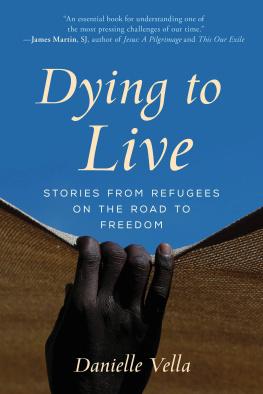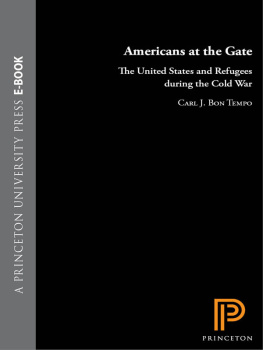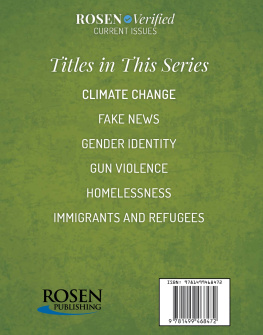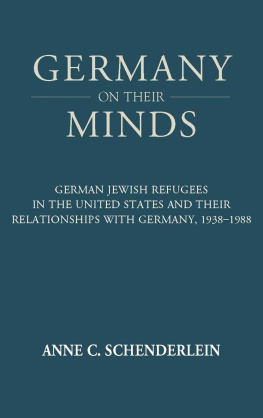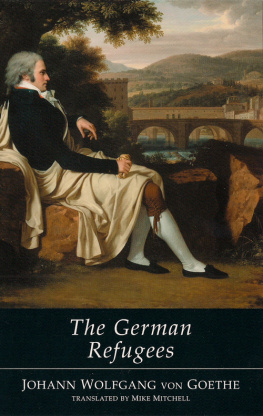To Sara, Zeke, Jamie, Kate, and Aidan
Copyright 2002 by Mary Pipher
All rights reserved. For information about permission to reproduce selections from this book, write to or to Permissions, Houghton Mifflin Harcourt Publishing Company, 3 Park Avenue, 19th Floor, New York, New York 10016.
hmhbooks.com
Translation of Hoa Sen (The Lotus Flower) taken from The Lotus Seed by Sherry Garland.
A portion of the proceeds from this book will be donated to The Pipher Refugee Fund, Lincoln Action Program, 210 O Street, Lincoln, Nebraska 68508.
The Library of Congress has cataloged the print edition as follows:
Pipher, Mary Bray.
The middle of everywhere: the worlds refugees come to our town/
Mary Pipher.1st ed.
p. cm.
Includes bibliographical references and index.
ISBN 0-15-100600-8 (perm. paper) ISBN 0-15-602737-2 (pbk.)
1. RefugeesUnited States. I. Title.
JV6601 .P56 2002
305.9'0691dc21 2001005863
eISBN 978-0-547-54211-9
v2.0520
There seemed to be nothing to see, no fences, no creeks or trees, no hills or fields. If there was a road I could not make it out in the faint starlight. There was nothing but land. Not a country at all but the material out of which countries are made.
W ILLA C ATHER
Foreword
As long as there is respect and acknowledgment of connections, things continue working. When that stops, we all die.
J OY H ARJO
I finished this book on refugees in Nebraska on September 9 and on September 10 my husband and I flew to Canada. This was our first vacation in a year, a well-earned vacationa time to catch up on laughter, sleep, hikes, and novels. We drove from Calgary to a cabin nestled along Baker Creek in a valley between Castle Rock and Storm Mountain. On our way we stopped to watch caribou and mule deer. The bushes and grasses were turning mauve and rose, the aspens golden. In the late afternoon sunlight, we marveled at the luxury of living cradled in these mountains for a week.
Tuesday morning we woke early and planned our first hike. As we walked out into a blue and gold day, a man stopped us and asked if we were Americans. When we nodded, he said, Some terrible things are happening in your country. Youd better go to the basement gym and watch television.
We sat on folding chairs with other tourists for several hours. No one talkedwe just watched and cried. At first I was in shock, then slowly I began to piece together the personal implications. I worked with three publishing companies in New York and I worried if my friends were safe. My daughter was scheduled to fly to D.C. from Cape Town, South Africa, Tuesday morning. Where was she? The Canadian/United States border and the airports were closed. How would we get home? Yet never had my own little life looked so petty. There were bigger issues: How many people were dead? What did this mean for America? What would happen to my refugee friends? Was the world as we knew it gone?
Later we walked outside into the crisp September afternoon. The world had changed and the world was the same, the same golden aspen and purple grasses, the same ripe rose hips and rushing water over smooth gray stones. We were safe in a beautiful place, but we werent thinking and feeling what we had planned to be thinking and feeling.
As I looked through our binoculars for grizzlies and mountain sheep, I was thinking is my editor dead? Are people trapped under the rubble right now, scared and in pain? I imagined how frightened the passengers on the hijacked jets must have been, and I kept hearing imaginary airplanes. Watching the river, my husband said sadly, No matter how crazy we humans act, the water keeps on flowing.
The beautiful time and place seemed to deliberately induce irony and contrast. The silver glaciers, emerald forests, and turquoise lakes humbled us. I kept thinking about all this sacred beauty in our sad, deformed world.
On 9/11, the book I had just finished seemed meaningless. The Middle of Everywhere felt like it had been written in and for a world that no longer existed. But later that afternoon, as I tried to read the books Id brought with meone on the Sand Hills of Nebraska and another on the life of Ben FranklinI realized they were irrelevant, too. On September 11 everythingShakespeare, Broadway, flower gardens, Bob Dylanwas irrelevant. Only Jihad and death seemed to matter.
Fortunately time didnt stop on September 11. As weeks passed we all began to put our terrible tragedy into perspective. My book began to seem applicable to the new world, maybe even more so than before. Refugees were still here, and they were even more beleaguered. A Kurdish family called to say, We are confused and frightened and cannot eat. We have been harassed at work for being Muslim. Mohamed told me, Bintu and I fear we have brought the war from Sierra Leone to America. We thought America was safe. Now we dont know where to run.
One of our greatest needs as a nation is to understand how other people see us, and this book is filled with stories about how people from different countries and religious traditions view Americans. In the aftermath of the disaster we all have images of Arab terrorists in our heads. In spite of our values and best intentions, we all are occasionally guilty of racial profiling. This book gives readers other images and replaces fearful stereotypes with stories of real and interesting people. I truly hope it will be an antidote to hatred and fear.
I have been struck by the kindness of many Americans toward our Muslim neighbors. One of my friends, a psychologist, lost his brother who worked at the World Trade Center. As he flew back to New York to pack up his brothers apartment, he made arrangements to start a Muslim-support group for local people. At Lincoln High students asked their teachers how they could organize to help Muslim kids. Twenty members of our South Street Temple volunteered to help refugees who were frightened by the recent events. Our politicians, our newspapers, and our churches have worked non-stop to make sure no hate crimes were committed in our town.
All over our country people have an impulse to help, to make our country safer and stronger. One of the best ways to help is to befriend newcomers. As we welcome refugees and teach them about us, we learn about them, and we develop wiser and more nuanced views of our world. This book encourages Americans to become involved with newcomers and offers many ideas about how to do that.
After September 11, we are all refugees from what was once our America. We have been exiled from a country that felt safe and calm and now we live in a new country filled with fear. We can learn from the refugees among us how to deal with our fears and sorrows. Our newcomers have experienced panic, loss, disruption, and vulnerability. They have learned to cope with catastrophes, and they can teach us how to survive these things. They can help us learn to live in the world with broken hearts.
Now that we have been terrorized, we have more empathy with others. When I returned from Canada I told Mohamed that, for the first time, I felt I could understand how he felt in Sierra Leone, not that our situation was as terrible, but that I had experienced similar feelings of shock, fear for my children, confusion, and depression. He was very quiet and then said, Im sorry you have to know how I feel.
On September 11 Americans felt what many of the worlds people have felt for years. That day ended our illusions about our invulnerability and our isolation from the rest of the world. We joined the worlds huddled masses yearning to breathe free. We need more than ever what I call the attributes of resilience. We all want and need what refugees want and need. We yearn for family and friends, meaning, calmness, routines, useful work, and spiritual solace.

